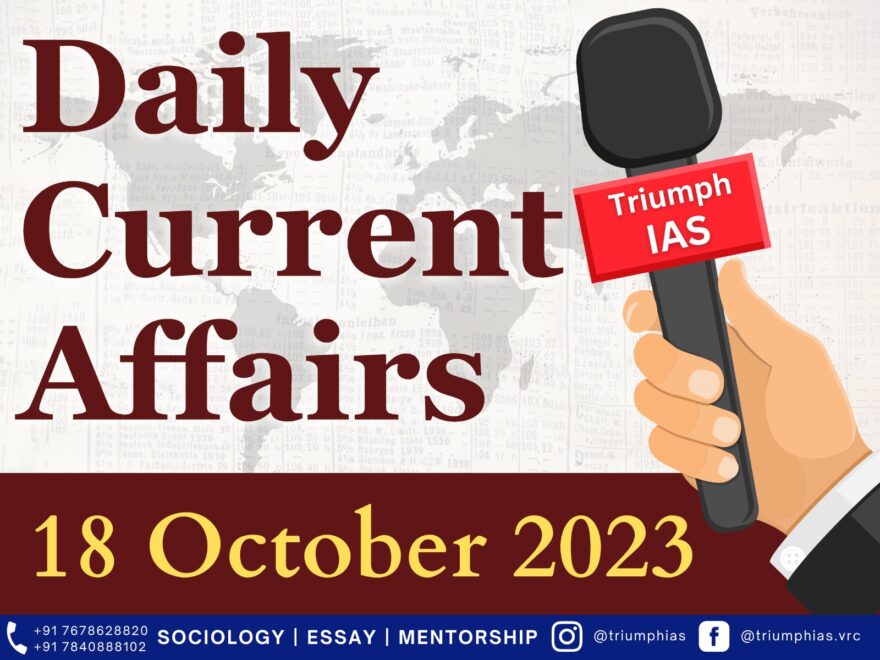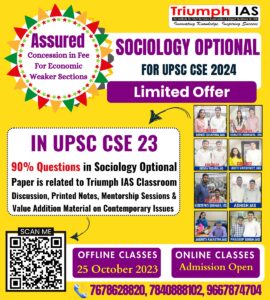Current Affairs 18 October 2023.
Today’s News.
Law and custom: Court verdict leaves queer people with long struggle ahead for equality.
Current Affairs 18 October 2023 | Relevant for GS Paper-2, fundamental right.
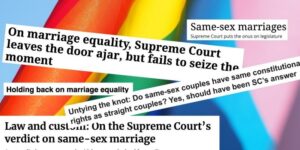
- The Supreme Court of India’s refusal to accord legal recognition to marriages between persons of the same sex is a huge legal setback to the queer community in the country.
- Given the progress in law in recent years and the deepening of the meaning of individual rights, there was widespread expectation that the five judge Constitution Bench would give the Special Marriage Act (SMA), a law that allows any two people to marry, a gender neutral interpretation to include people belonging to the same sex.
- Over the years, the amplitude of Article 21 of the Constitution has been expanded to cover the rights of privacy, dignity and marital choice, but the highest court has stopped short of the extra step needed to allow marriages or civil unions that are not heterosexual.
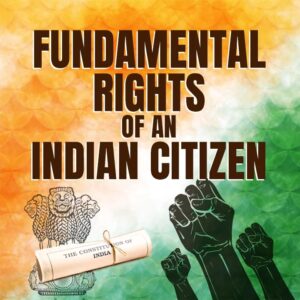
- In concluding that there is no fundamental right to marry, the Court has negated the expectation that it would not allow discrimination against same sex couples in the marital domain to continue.
- Marriage is indeed a social institution, with its own legal requirements and conditions for what constitutes a valid marriage. The right to seek social and legal validation through marriage is a matter of individual choice protected by the Constitution, but the Court still views it as being subject to statutory limitations.
- There is no disagreement among the judges about the right of such same sex couples to cohabit and be free from coercion and threats. Given that large sections of India may be opposed to the legalization of same sex marriages on religious and cultural grounds, the possibility of Parliament taking the initiative to do so is quite bleak.
- The LGBTQIA+ community may now have to take heart from the Court’s direction that the government should form a committee to decide the rights and entitlements of queer couples.
How synergistic barriers are affecting progress on SDGs.
Current Affairs 18 October 2023 | Relevant for GS paper-3, Development.
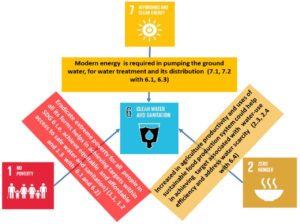
- Lamenting the lack of progress on various Sustainable Development Goals (SDGs), world leaders at the SDG Summit in New York on September 18 and 19, once again reaffirmed their shared commitment to eradicate poverty and end hunger.
- While this political declaration needs to be welcomed as a renewed commitment to Agenda 2030, there is little to inspire confidence that there will be greater progress.
- A 2023 report of the United Nations Conference on Trade and Development estimated the investment gap in SDGs in developing countries to be greater than $4 trillion. Of this, nearly $2 trillion needs to be directed towards energy transition alone.
- A fundamental statement in the Agenda 2030 document detailing the SDGs, recognizes the indivisible and integrated nature of the 17 SDGs and their contribution to the three pillars of sustainable development.
- A lot of academic literature has also focused on the ‘synergies’ and ‘trade offs’ that exist in the pursuit of specific SDGs.
- A recently launched UN Expert Group Report, entitled ‘Synergy Solutions for a World in Crisis: Tackling Climate and SDG Action Together’, also laments the lack of synergistic action in the face of significant (modeled) evidence.
- This said, policymaking processes are generally robust, with a clear view on synergistic outcomes, especially when multi stakeholder approaches to policy making are practiced.
- At the same time, the ambitious renewable energy targets themselves became a barrier for small scale applications due to a misalignment of deliverables. While the energy departments had targets in gig watts, primary health centres had needs in kilowatts, leading to their neglect in energisation, even though the health outcomes could have been significant.
- Every new investment we initiate today leading to a high carbon outcome will likely result in higher dis synergies or trade offs in our ability to achieve our energy and climate goals.
- Establishing the domestic energy resources we have for reasons of enhancing resilience to shocks is a worthwhile goal but exploiting those resources without a full cost estimation – including weighing India’s own vulnerability to climate change impacts – of alternative pathways with their synergistic opportunities is detrimental to both national and global efforts.
A case for marriage equality: the legal arguments for same-sex marriage.
Current Affairs 18 October 2023 | Relevant for GS paper-1, salient feature of Indian society.
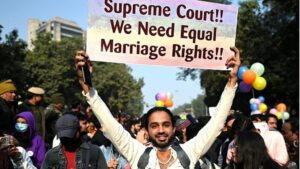
- On March 12, the Centre filed an affidavit in the Supreme Court frowning upon same-sex marriage. It invoked the “accepted view” that marriage between a biological man and woman is a “holy union, a sacrament and sanskar (culture)” in India. Many hold the view that the issue should be debated by Parliament and not by the courts.
- As the Union government has made its position clear on the legalization of same sex marriage and holds the view that queer people like me will wreak havoc on social institutions with our demands, Parliament will never enact such a law.
- It is also argued that this is not a matter of judicial interference, but one of interpreting the statutes. For laypersons and lawyers alike, the interpretation of statutes is an art.
- It is true that laws relating to marriage have a religious genesis. However, Indian law on marriage is a mixture of common law and religion.
- The court said in the Sabarimala case that religion must give way to constitutional morality, though a review of the judgment is pending. Nevertheless, most parties in the marriage equality case before the court are those who want to get married under the Hindu Marriage Act.
- It is also argued that the laws pertaining to marriage necessitate procreation. While this may be true, there seem to be no attempts to take away the marriage rights of heterosexual married couples who do not procreate as per mutual consent. While entering into a queer relationship, both parties are aware that they will be unable to procreate.
- It is also said that conventional conceptualisations of family and marriage are facing evolutionary challenges. This argument is based on the idea that a family comprises two parents of the opposite sex and their two children.
- This is not to argue that marriage will lead to queer liberation. In fact, marriage does not obfuscate but lays bare the caste hierarchies that embolden discrimination and segregation. But despite being a faulty institution, marriage is a legitimate legal need in order to file taxes jointly, inherit property, open bank accounts, and choose nominees for insurance policies.
- Legal recognition of queerness and love should not be opposed by the state or by some supposedly well meaning proponents of the doctrine of separation of powers. Queerness and queer love deserve not just legal recognition by the state, but to be celebrated.
Refresh basics
- The right to marry is not expressly recognized either as a fundamental or constitutional right under the Indian Constitution but a statutory right.
- Though marriage is regulated through various statutory enactments, its recognition as a fundamental right has only developed through judicial decisions of India’s Supreme Court. Such declaration of law is binding on all courts throughout India under Article 141 of the Constitution.
Earlier Views of Supreme Court on Same-Sex Marriages:
- Marriage as a Fundamental Right (Shafin Jahan v. Asokan K.M. and others 2018):
- While referring to Article 16 of the Universal Declaration of Human Right and the Puttaswamy case, the SC held that the right to marry a person of one’s choice is integral to Article 21 of the Constitution.
- Article 16 (2) in the Indian constitution provides that there cannot be any discrimination on grounds only of religion, race, caste, sex, descent, place of birth, residence or any of them.
- The right to marry is intrinsic to the liberty which the Constitution guarantees as a fundamental right, as the ability of each individual to take decisions on matters central to the pursuit of happiness. Matters of belief and faith, including whether to believe are at the core of constitutional liberty.
- LGBTQ Community Entitled to all Constitutional Rights (Navjet Singh Johar and others v. Union of India 2018):
- The SC held that members of the LGBTQ community “are entitled, as all other citizens, to the full range of constitutional rights including the liberties protected by the Constitution” and are entitled to equal citizenship and “equal protection of law”.
RITES Ltd, and IRCON Awarded Navratna Status.
Current Affairs 18 October 2023 | Relevant for Prelims, Economy..

- The Ministry of Finance has conferred the esteemed ‘Navratna’ status upon two Central Public Sector Enterprises (CPSEs) under the Ministry of Railways, Ircon International Limited (IRCON) and RITES Ltd (RITES).
- RITES is a leading transport infrastructure consultancy and engineering firm in India. It provides services in the diverse sectors of transportation.
- IRCON, initially named Indian Railway Construction Company Limited, was incorporated by the Central Government (Ministry of Railways) under the Companies Act, 1956 in 1976. It serves as a premier public-sector construction company.
- Navratna Companies in India are a group of CPSEs that have enhanced financial autonomy and flexibility to compete in the global market. They are given certain privileges, such as investing up to Rs 1,000 crore without explicit government approval.
- The Navratna status was first introduced in 1997. There are currently 16 Navratna Companies in India.
- To attain Navratna status, a firm must initially hold the Miniratna designation and it needs to achieve a score of 60 or more (out of 100) according to six performance criteria, which include metrics like Net Profit to Net Worth, Earnings per Share, and Inter-Sectoral Performance.
Green Credit Programme
Current Affairs 18 October 2023 | Relevant for GS paper-3, Ecology and Environment, Prelims.
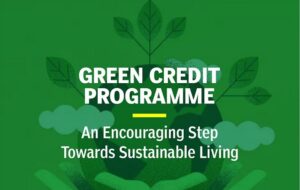
- The government has recently unveiled an innovative and voluntary Green Credit program designed to reward and incentivize individuals and entities for their positive environmental contributions.
- Green Credit refers to a unit of incentive provided to individuals and entities engaged in activities that deliver a positive impact on the environment.
- It is a voluntary program initiated by the government to incentivize various stakeholders in contributing to environmental preservation and sustainable practices.
- This program is part of the broader ‘LiFE’ campaign (Lifestyle for Environment), and it encourages and rewards voluntary environmentally-positive actions.
Covered Activities:
- The Green Credit program encompasses eight key types of activities aimed at enhancing environmental sustainability:
- Tree Plantation: Planting trees to increase green cover and combat deforestation.
- Water Management: Implementing strategies to efficiently manage and conserve water resources.
- Sustainable Agriculture: Promoting eco-friendly and sustainable agricultural practices.
- Waste Management: Implementing effective waste management systems to reduce environmental pollution.
- Air Pollution Reduction: Initiatives aimed at reducing air pollution and improving air quality.
- Mangrove Conservation and Restoration: Protecting and restoring mangrove ecosystems for ecological balance.
Earning and Calculation of Green Credit:
- To earn Green Credits, participants need to register their environmental activities through a dedicated website. The activities will then be subject to verification by a designated agency.
- Based on the agency’s report, the administrator will grant the applicant a certificate of Green Credit.
- The calculation of Green Credit is determined by factors such as resource requirements, scale, scope, size, and other relevant parameters necessary to achieve the desired environmental outcomes.
Green Credit Registry and Trading Platform:
- A critical component of the program is the establishment of a Green Credit Registry, which will help track and manage earned credits.
- Additionally, the administrator will create and maintain a trading platform, enabling the trading of Green Credits on a domestic market.
Independence from Carbon Credits:
- It is important to note that the Green Credit program operates independently of the carbon credits provided under the Carbon Credit Trading Scheme, 2023, which is governed by the Energy Conservation Act of 2001.
- An environmental activity generating Green Credits may have climate co-benefits, such as reducing or removing carbon emissions, which can potentially lead to the acquisition of carbon credits in addition to Green Credits.
Concerns Regarding Green Credit Programme:
- Verification and Validation Complexity: The process of verifying and validating environmentally-positive actions can be complex and time-consuming.
- Concerns exist regarding the administrative burden on both participants and regulatory bodies.
- Risk of Greenwashing: There is a risk that some participants may engage in green washing, where they falsely claim environmentally-friendly activities to earn Green Credits without genuinely contributing to environmental conservation.
- Compatibility with Carbon Credits: While the program is intended to be independent of carbon credits, there are concerns about potential overlaps and the complexity of evaluation between the two types of environmental credits.
- Accounting for Regional Differences: The program may struggle to account for regional variations in environmental impact, making it challenging to establish uniform credit values for diverse geographical areas.
Related Blogs…
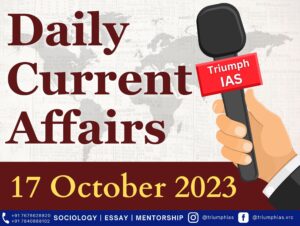 |
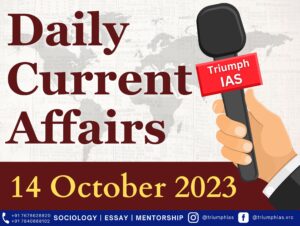 |
GS Related Practices Question…
To master these intricacies and fare well in the Sociology Optional Syllabus, aspiring sociologists might benefit from guidance by the Best Sociology Optional Teacher and participation in the Best Sociology Optional Coaching. These avenues provide comprehensive assistance, ensuring a solid understanding of sociology’s diverse methodologies and techniques.
META TAGS:
Current affairs 13 October 2023, Current affairs 12 October 2023, Today news, Today news GS, Today news upsc, Today news and views, Today news 2023, Today news Current affairs September 2023, Current affairs news, Current affairs book pdf, Current affairs best blog, Current affairs for UPSC, Current affairs 2023, Current affairs contact, Current affairs book, Current affairs program meaning

Choose The Best Sociology Optional Teacher for IAS Preparation?
At the beginning of the journey for Civil Services Examination preparation, many students face a pivotal decision – selecting their optional subject. Questions such as “which optional subject is the best?” and “which optional subject is the most scoring?” frequently come to mind. Choosing the right optional subject, like choosing the best sociology optional teacher, is a subjective yet vital step that requires a thoughtful decision based on facts. A misstep in this crucial decision can indeed prove disastrous.
Ever since the exam pattern was revamped in 2013, the UPSC has eliminated the need for a second optional subject. Now, candidates have to choose only one optional subject for the UPSC Mains, which has two papers of 250 marks each. One of the compelling choices for many has been the sociology optional. However, it’s strongly advised to decide on your optional subject for mains well ahead of time to get sufficient time to complete the syllabus. After all, most students score similarly in General Studies Papers; it’s the score in the optional subject & essay that contributes significantly to the final selection.
“A sound strategy does not rely solely on the popular
Opinion of toppers or famous YouTubers cum teachers.”
It requires understanding one’s ability, interest, and the relevance of the subject, not just for the exam but also for life in general. Hence, when selecting the best sociology teacher, one must consider the usefulness of sociology optional coaching in General Studies, Essay, and Personality Test.
The choice of the optional subject should be based on objective criteria, such as the nature, scope, and size of the syllabus, uniformity and stability in the question pattern, relevance of the syllabic content in daily life in society, and the availability of study material and guidance. For example, choosing the best sociology optional coaching can ensure access to top-quality study materials and experienced teachers. Always remember, the approach of the UPSC optional subject differs from your academic studies of subjects. Therefore, before settling for sociology optional, you need to analyze the syllabus, previous years’ pattern, subject requirements (be it ideal, visionary, numerical, conceptual theoretical), and your comfort level with the subject.
This decision marks a critical point in your UPSC – CSE journey, potentially determining your success in a career in IAS/Civil Services. Therefore, it’s crucial to choose wisely, whether it’s the optional subject or the best sociology optional teacher. Always base your decision on accurate facts, and never let your emotional biases guide your choices. After all, the search for the best sociology optional coaching is about finding the perfect fit for your unique academic needs and aspirations.
To master these intricacies and fare well in the Sociology Optional Syllabus, aspiring sociologists might benefit from guidance by the Best Sociology Optional Teacher and participation in the Best Sociology Optional Coaching. These avenues provide comprehensive assistance, ensuring a solid understanding of sociology’s diverse methodologies and techniques. Sociology, Social theory, Best Sociology Optional Teacher, Best Sociology Optional Coaching, Sociology Optional Syllabus.
Best Sociology Optional Teacher, Sociology Syllabus, Sociology Optional, Sociology Optional Coaching, Best Sociology Optional Coaching, Best Sociology Teacher, Sociology Course, Sociology Teacher, Sociology Foundation, Sociology Foundation Course, Sociology Optional UPSC, Sociology for IAS,
Follow us :



Find More Blogs…
| Compare and contrast Karl Marx’s and Max weber’s | Karl Marx- Historical Materialism |
| Talcott Parsons : Social system | Scope of the subject and comparison with other social sciences |

